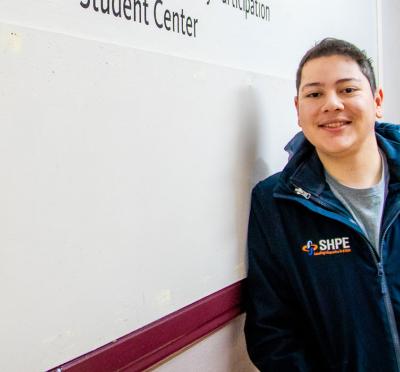Christian Horton, a senior in construction engineering management at Oregon State University, was honored with an outstanding student achievement award at the 2021 ASC Open Mechanical competition hosted by the Associated Schools of Construction in February.
The Oregon State Mechanical team placed second overall. Other team members were Evan Lehman, Connor Splitstoser, Amin Tuffa, Keven Estupinian, and Thomas Robinson. Joe Fradella, senior instructor in the School of Civil and Construction Engineering, served as the team’s faculty coach.
Popularly known as the Reno competition, this year’s event was conducted online because of the coronavirus pandemic. Horton and his teammates’ preparations began last fall, including a two-term “Reno class” course sequence. While they spent a lot of time getting ready for the competition, when the big day came, nobody knew quite what to expect.
“You have 14 hours to work on a problem from a real-world project that has already been completed, and then you have an hour to present your solution,” Horton explained. “The judges include people who worked on the original project, so they know all the ins and outs. There’s not too much wiggle room.”
The day began at 6 a.m., when Horton jumped onto a Zoom video conference with his teammates. By 7 a.m., the team sponsor had released a folder containing about 5 gigabytes of documents: construction plans, drawings, various specifications, and customer communications.
Horton’s project involved installing some large, complex air handler units and chillers in San Francisco’s Moscone Center, a 2-million-square-foot concrete convention facility in a busy downtown area adjacent to the Bay Bridge. Assuming the role of project manager, Horton was tasked with finding a way to complete the installation with minimal disruption to building operations and surrounding traffic.
“These are massive units, basically the size of a small shipping container,” Horton said. “There are no doors in the building large enough to fit a unit through, and with multiple units to install, it requires extensive pre-planning.”
The Moscone Center presented Horton a very big box to think outside of. Part of the challenge lay in sorting through the thousands of pages of information, with no indication where to begin or how to find anything he might be looking for. Then there was the difficulty of trying to conceive of complex interactions in three dimensions and recognize potential clashes, relying exclusively on two-dimensional reference materials.
“I worked for a good 10 hours analyzing drawings and layouts with nothing to show on paper,” Horton said. “It was a bit nerve-racking as the clock was ticking and my team was counting on me.”
Then, he hit upon an idea.
First, he’d identify the best point of access that would cause the least disruption or destruction, and reroute traffic around the site. Then, he’d excavate the area outside the convention center and open up a hole in the wall roughly the size of an air handler unit. Finally, with a mobile crane oriented just right, he could stack the units on top of each other inside the building by hoisting through an existing cooling tower chimney stack.
The idea of working with massive equipment doesn’t intimidate Horton. Before going to college, the 28-year-old spent several years working overseas as a roughneck in the offshore oil and gas industry, a job that took him to Italy and Romania, and into the Black Sea. He had originally intended to jump into the construction trades straight after high school, but he found the allure of black gold too strong to resist. (“It’s kind of a family tradition,” he said.)
Working on a six-month construction project on an oil rig in 2014, with people from about 20 other countries, gave Horton unique perspective and experience.
“You’ve got people coming and going from all directions. You’re trying to communicate with people who speak zero English, and you don’t speak their language either. Meanwhile there’s 100,000 pounds of equipment hanging over your head,” he explained. “Nothing compares to the oil and gas industry; however, construction has its own unique demands and challenges, which I am eager to learn and master.”
At 9 p.m. the night of the competition, the team members had to submit their final reports, then rest up for their presentation the following morning. The judges were impressed with the work, but they still managed to throw Horton a curveball or two.
“They asked how the building would operate while the air handlers were being replaced,” Horton said. “I had zero time to look up an answer. Thinking from the top of my head, I explained that the work was going to take place during a time when the temperatures would be moderate, so the system would not experience any heavy loads, and the secondary units would still be functioning.”
Horton credits his fast thinking for the award he received.
In addition to his previous work experience, Horton says industry coaches Reggie McShane, Garret Eisenbrandt, and Grant Smith of TCM Mechanical were instrumental in helping the team prepare for success in the competition.
“Christian is a focused, hardworking student who has some real-world experience that has definitely helped him,” said McShane, who has coached teams from Oregon State in Reno competitions for the past five years. “He was a leader within the group, and the students who enter this competition are already top performers who want to excel. They have to put in a lot of extra time and effort.”
After graduation in June, Horton will begin work as an assistant project manager for Rosendin Electric in Prineville, where the firm is currently building data centers for Facebook.



